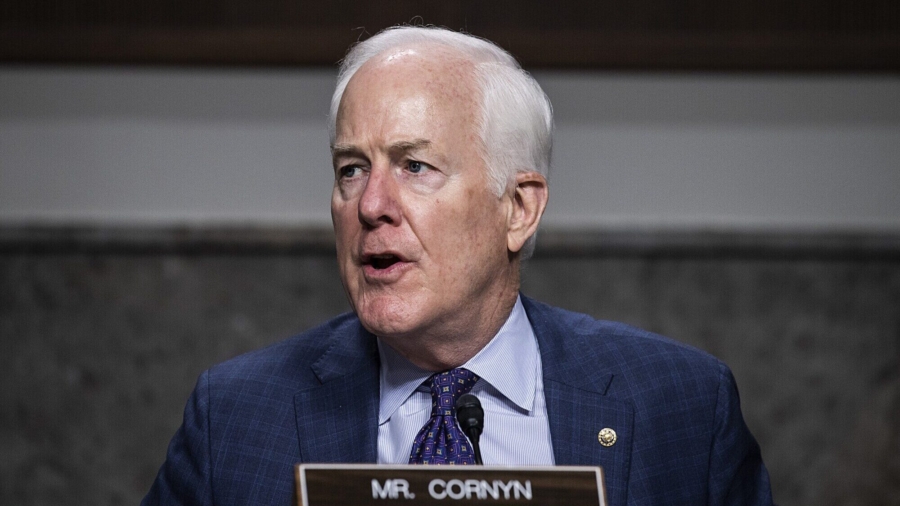Sens. John Cornyn (R-Texas) and Bill Hagerty (R-Tenn.) introduced a pro-Second Amendment bill on Wednesday that would allow gun owners with concealed carry privileges in their home states to exercise those same rights in any other state with concealed carry laws.
The bill, the Constitutional Concealed Carry Reciprocity Act, is co-sponsored by 43 other Senate Republicans, including Senate Republican Leader Mitch McConnell.
“I’m proud to support law-abiding gun owners across America with this commonsense legislation,” Cornyn said in a press release about the proposed bill. “This legislation strengthens two of our most fundamental constitutional protections—the Second Amendment’s right of citizens to keep and bear arms and the Tenth Amendment’s right of states to make laws best-suited for their residents.”
Also calling the legislation “commonsense,” Hagerty said, “The constitutional right of self-defense should not disappear simply because an individual crosses state lines.”
“I’m pleased to join my Senate colleagues … to ensure that law-abiding Tennesseans who are permitted to carry a concealed firearm are able to exercise that right in other states, consistent with those states’ laws, without having to obtain a separate permit,” he added.
According to Cronyn’s press statement, the measure will treat state-issued concealed carry permits like drivers’ licenses “where an individual can use their home-state license to drive in another state but must abide by that other state’s speed limit or road laws.”
The statement also emphasized that the legislation protects state sovereignty; it “does not establish a national standard for concealed carry.”
Cronyn has introduced similar legislation several times in the past as far back as 2015, The Hill reported.
Many states allow for reciprocity regarding concealed carry permits, but they vary from state to state.
“The current patchwork of state and local gun laws is confusing and can cause the most conscientious gun owner to unknowingly run afoul of the law when they are traveling or temporarily living away from home,” said Chris Cox, then-executive director of the National Rifle Association Institute for Legislative Action, regarding Cronyn’s 2019 attempt to pass similar concealed carry reciprocity legislation.
“Law-abiding citizens should be able to exercise their fundamental right to self-defense while traveling across state lines,” Cox said.
Some pro-Second Amendment groups have misgivings about passing a reciprocity law on the federal level. Concealed Nation explained that such a law would inspire a strong incentive for already restrictive states, like California, to prohibit concealed carry altogether, and other more “middle of the road states,” like Oregon, to make it substantially more difficult for their residents to carry a firearm.
A companion bill, H.R. 38–Concealed Carry Reciprocity Act, was introduced in the U.S. House of Representatives by Republican North Carolina Rep. Richard Hudson on Jan. 9.
State Laws Concerning Concealed Carry
According to The Gun Rights, the simplest definition for concealed carry is “the practice of carrying a weapon in public without it being obvious to everyone around.”
Currently, all 50 states allow for concealed carry, though the specific laws vary from state to state. And according to handgunlaw.us, over 21 million gun owners have permission to conceal carry across the United States.
Concealedcarry.com explains that concealed carry laws fall into one of three categories: shall issue, may issue, and constitutional carry (or permitless carry).
- Shall issue: Citizens who meet state requirements may obtain a concealed carry permit, and the issuing authority cannot “employ any arbitrary bias or discretion” to withhold permits. These laws can apply to residents only or residents and non-residents.
- May issue: Also called “Discretionary Permit System.” Citizens who meet state requirements may obtain a concealed carry permit; however, local authorities can determine whether or not to issue a permit, despite the applicant meeting all state requirements. In these states, the applicant must demonstrate “a need.” These laws can apply to residents only or to residents and non-residents.
- Constitutional: Also called “permitless” or “unrestricted.” No permit is required to carry a concealed firearm. These laws can apply to residents only or residents and non-residents.
Exactly half of the states in the United States allow for what’s called “constitutional” or “permitless” carry laws.
Florida is poised to tip the balance with their current state legislation, introduced to the Florida Senate on Jan. 30, that would allow Floridians to carry a concealed firearm “without having to get a government-issued permit,” Fox News reported.

